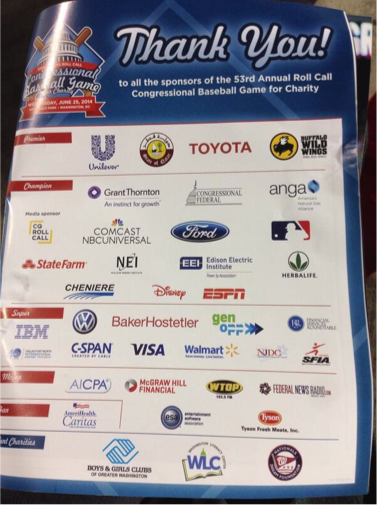Congress
When lawmakers convened for the annual Congressional Baseball Game for Charity in July 2014, they were greeted with packets reminding them of the event’s sponsors: Cheniere, the LNG firm that was the first to win an export license from the federal government, and ANGA, the lobbying association pushing for more exports.

The LNG lobby has had much success with using Congress as a tool for speeding up the LNG export permitting process. Just a month before the baseball game, on June 25, the House of Representatives passed H.R. 6, the “Domestic Prosperity and Global Freedom Act” with bipartisan support in a vote tally of 266-150. The legislation would require the Department of Energy to issue a decision on an LNG export application within 90 days of filing. Although it died upon arrival in the Senate, industry-friendly Senator Mark Udall (D-CO) introduced the bill in April with two other Democratic Party co-sponsors: Alaska Reps. Heidi Heitkamp and Mark Begich. Mark Udall recently lost his senate reelection campaign to the sponsor and author of H.R. 6, Rep. Cory Gardner (R-CO).
H.R. 6 received a vote after several congressional hearings on the topic. Those hearings, held largely by the House Energy and Commerce Committee, have been led on the inside by former LNG lobbyists. Tom Hassenboehler, a counsel for the committee, is a former lobbyist for ANGA. Patrick Currier, another staffer to the committee, formerly worked for FirstEnergy Corp and other natural gas lobbying interests.
In total, 57 unique corporate-funded entities and/or corporations lobbied on behalf of H.R. 6, according to OpenSecrets.org, with 278 lobbyists working to convince members of Congress to pass the bill. The largest companies to back H.R. 6 included Koch Industries, ExxonMobil, Anadarko, Statoil, Eastman Chemical, FirstEnergy Corp, General Electric, Halliburton, Dominion Resources, Dow Chemical, Chesapeake Energy, Chevron, Sempra Energy, Marathon Oil, and BP.
At least on the House side, the fruits of the lobbying labor paid off.
